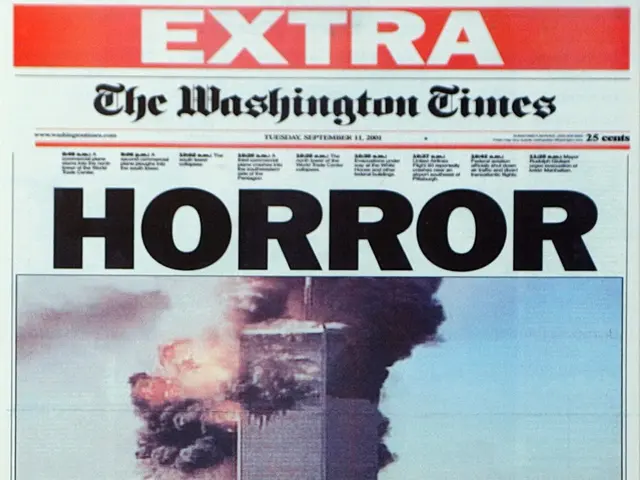Concerns escalate over Trump's potential involvement and the welfare of homeless individuals in detention camps amidst the approach of the Olympic Games.
In the lead-up to the 2028 Los Angeles Olympics, the Trump administration's approach to addressing homelessness has raised significant concerns among local officials and advocates.
President Trump, who chairs a federally led Olympics security task force, has established a security-focused, enforcement-heavy approach. Reports suggest that the administration is considering forcibly relocating homeless people into designated shelters or detention-like facilities far from city centres, similar to actions in Washington, D.C. [1]
This potential plan has sparked fears of human rights violations, as homeless individuals may be forcibly relocated into detention centres during the Olympics to "clean up" the city's appearance [1]. Local officials are also concerned about the militarization of security efforts and an erosion of local control, given past clashes between federal agents and local authorities over law enforcement jurisdiction and tactics [3].
Budget constraints hinder L.A.'s ability to implement more humane or locally tailored solutions, especially without sufficient federal support [1][4]. The Trump administration's reported cuts or withholding of federal funding for homelessness services from Los Angeles further exacerbates this issue [4].
The administration is also ending federal support for "housing first" and harm reduction strategies, favouring conditional housing linked to substance abuse or mental health treatment [5]. This shift in policy is a reversal from California's long-standing housing-first approach, which aims to provide stable shelter before treatment.
Mayor Bass, on the other hand, has made homelessness her signature issue since her election in 2022, focusing on offering housing and services voluntarily without fines or jail time [2].
Local officials and advocates have been vocal in their criticism of the Trump administration's approach. Supervisor Janice Hahn has criticised the federalization of local law enforcement and the deployment of the U.S. military to American cities [6]. Eric Sheehan, a member of NOlympics, shares concerns about the Trump administration's actions during the Olympics but believes the federal approach to homelessness may not differ much from what local officials are already doing [7].
Amy Turk, chief executive of the Downtown Women's Center, is concerned about using the police and military to address homelessness, as it is an expensive intervention that merely moves people from one place to another [8]. Gary Blasi, a professor emeritus at UCLA School of Law, has expressed similar concerns about the potential for federal troops to force homeless people into detention centres during the 2028 Olympics in Los Angeles [9].
Despite these concerns, it is important to note that the federal government cannot legally lock up people for living on the streets in Los Angeles [10]. However, they could make life difficult enough that homeless people have no other options.
In a positive development, homelessness in both the city and county of Los Angeles has decreased in the last two years, particularly the number of unsheltered people [11]. This progress, however, is threatened by the Trump administration's approach to the 2028 Olympics homelessness issue.
White House Press Secretary Karoline Leavitt did not answer questions about a plan to address homelessness in Los Angeles in preparation for the Olympics [12]. As the 2028 Olympics approach, it remains to be seen how the Trump administration will address homelessness in Los Angeles and whether their approach will be met with further criticism and concern.
References:
- Los Angeles Times
- Los Angeles Times
- The Guardian
- Los Angeles Times
- Los Angeles Times
- Los Angeles Times
- Los Angeles Times
- Los Angeles Times
- Los Angeles Times
- Los Angeles Times
- Los Angeles Homeless Services Authority
- Los Angeles Times
- The Trump administration's strategy for addressing homelessness in Los Angeles before the 2028 Olympics has raised concerns among local officials and advocates about potential human rights violations.
- Local officials worry about the militarization of security efforts and a possible erosion of local control due to the administration's enforcement-heavy approach.
- Budget constraints and limited federal support hinder Los Angeles' ability to implement more humane and locally tailored solutions to homelessness.
- The Trump administration reportedly plans to ending federal support for "housing first" and harm reduction strategies, favoring conditional housing linked to substance abuse or mental health treatment.
- Los Angeles Mayor Bass has prioritized addressing homelessness, focusing on providing housing and services voluntarily without fines or jail time.
- Critics of the Trump administration's approach include Supervisor Janice Hahn, who expressed concern about the federalization of local law enforcement, as well as Eric Sheehan of NOlympics.
- Experts like Amy Turk of the Downtown Women's Center and Gary Blasi, professor emeritus at UCLA School of Law, are concerned about the potential use of police and military to address homelessness, as it may lead to detention of homeless individuals during the Olympics.
- Despite concerns, the federal government cannot legally lock up homeless people in Los Angeles for living on the streets.
- Homelessness in Los Angeles has decreased in the last two years, particularly the number of unsheltered people, but the Trump administration's approach to the Olympics homelessness issue threatens this progress.
- White House Press Secretary Karoline Leavitt did not answer questions about a plan to address homelessness in Los Angeles in preparation for the Olympics.
- As the 2028 Olympics approaches, it remains unclear how the Trump administration will address homelessness in Los Angeles and whether their approach will continue to face criticism and concern.







